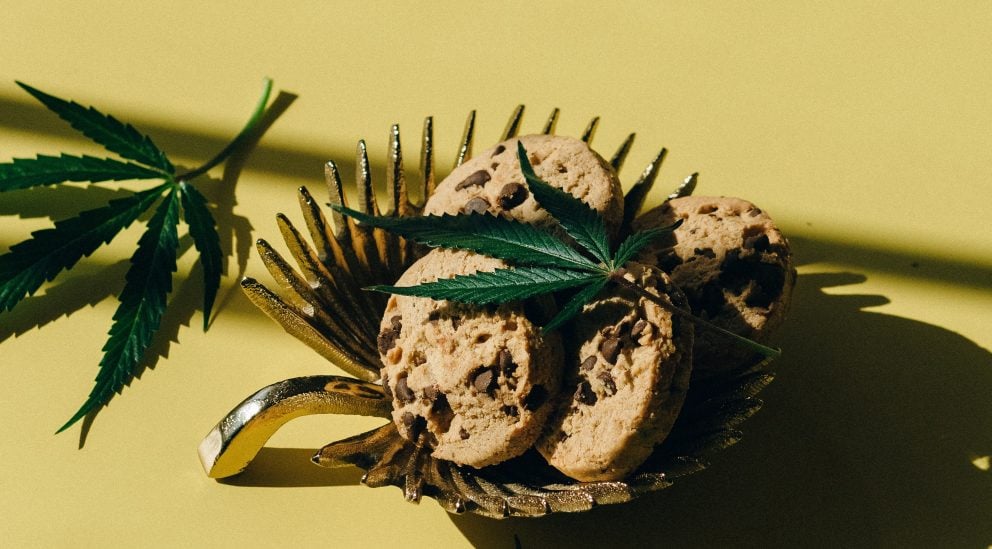
Photo by Damian Barczak
Trying marijuana for the first time can be daunting. How does weed make you feel? Does weed make you dizzy? What is it like to be high? These are just some of the questions people have about weed. And these questions are becoming increasingly prominent as more and more states legalize cannabis.
In fact, 46% of American adults say they have tried pot at least once. In this article, we answer people’s most common questions about how consuming cannabis will make them feel.
Marijuana and the Endocannabinoid System
Cannabis produces its effects via the human body’s endocannabinoid system (ECS).
Since marijuana contains more than 100 cannabinoids, this substance can impact both your mind and body.
It’s these endocannabinoids that are responsible for playing an essential role in a variety of functions, including sensory perception and memory. While marijuana contains all these cannabinoids, the two most important are cannabidiol (CBD) and Delta-9 Tetrahydrocannabinol (THC).
Note that Delta-8 THC is a different substance found in some forms of marijuana. Despite their similarities, they’re not the same.
THC is the psychoactive component of marijuana, and its effects are due to its ability to bind to the CB1 receptors within your ECS. Once they bind with these receptors, they send signals to the brain, which changes how you feel and think temporarily.
Humans have long recognized the benefits of this mechanism, which is why an estimated 182.5 million people consume cannabis products globally.
[fl_builder_insert_layout id=13138]
How Does Weed Make You Feel?
Now that you know why cannabis can impact the mind and body, what are you likely to experience while being high?
Whether this is your first time or you are a veteran, everyone who consumes cannabis will experience different stages of being high. Note that the timelines will differ based on how you consume cannabis.
For this section, we assume that you are smoking weed.
Stage One – New High
The first moments after inhaling marijuana, you may not feel anything. Instead, it may take a few moments to set in as you exhale and the impact of the THC begins to move across your mind.
This is also where many first-timers make the mistake of assuming it isn’t working and consume more.
Stage Two – Euphoria
The second stage of your high is when the most obvious signs of being high begin to appear. Groups of friends lower their inhibitions. Laughing becomes easy, and all of your worries will wash away.
You may notice that you’re experiencing a body high at this stage. Expect to feel waves of tingling as the THC moves throughout your limbs.
Stage Three – The Goldilocks Zone
The third stage is where most people feel in perfect harmony. The food tastes great, and the music sounds better. Everyone is more fun. You may also begin to hallucinate if you smoked some particularly strong bud.
Ideally, this is where you should stop smoking because you have achieved the peak of a pleasant high.
Photo by RDNE Stock Project
Stage Four – One Too Many
The fourth stage is optional, but every smoker has experienced it at some point. In stage four, beginners tend to rip one more bong hit or consume another brownie.
Your mind may stop as it replays the same thing repeatedly. Your body feels difficult to move because you appear to have no energy.
In some scenarios, you may even experience paranoia. Approximately one in five smokers may experience paranoia at this stage. However, this is not a permanent effect and will wear off. The best course of action is to sip some water and allow the high to run to its conclusion.
Stage Five – Coming Down
In the final stage, you will begin to come down from the peak. How you feel will depend on whether you experienced stage four.
If you come down from the perfect high, you will feel like you are slowly descending a pathway into relaxation. You may feel tired or hungry, but the world will gradually normalize.
On the other hand, if you consume too much and feel dizzy or experience hallucinations, coming down may feel like it takes longer. But as any anxiety or stress disappears, you will feel tired yet relieved.
In all cases, the best way to recover from an epic high is to get some sleep.
Does Weed Make You Hallucinate?
Cannabis is a special type of substance because it does not fall neatly into one category. The weed plant is considered a stimulant, depressant, and hallucinogen simultaneously.
However, weed hallucinations are relatively rare. Beginners are most prone to them because of their inability to dose correctly. According to the National Institutes of Health, people who have taken large doses of marijuana may experience hallucinations, delusions, and even acute psychosis.
Despite how scary this sounds, the easiest way to avert this type of catastrophe is to lower your dosage and know your limits.
Photo by RDNE Stock Project
Does Weed Make You Dizzy?
Marijuana can and will make you dizzy. This is considered a minor side effect and is no cause for concern.
According to a 2012 study into medical marijuana, 30-60% of patients experienced lightheadedness or dizziness. Again, this is often due to high dosages of marijuana, but why does weed make you dizzy?
Marijuana partially impacts the part of your brain responsible for coordination. But cannabis also causes dizziness because it lowers blood pressure and cerebral blood flow. These are the two primary reasons why weed can make you dizzy.
Thankfully, these symptoms usually last no more than an hour or two.
What are Some of the Common Signs Someone is High?
Figuring out how to tell if someone is high is relatively straightforward because of the obvious symptoms. In most cases, you can tell whether someone has smoked in a matter of seconds.
So, what are the symptoms of being high?
Giggles
Whether you are laughing, giggling, or find just about everything in the world hilarious, these symptoms appear due to the euphoria that cannabis causes.
Weed can lead to mood changes for the better as inhibitions come down and your worries wash away.
Red Eyes
The eponymous “weed eyes” are perhaps the most apparent sign that someone has smoked marijuana recently.
Your eyes become red because marijuana leads to the blood vessels dilating, which manifests in bloodshot eyes.
Altered Perceptions
Marijuana is powerful because it can change how you perceive time and space. It can also impact your sensory experiences.
Some of the ways this can happen include:
- Colors become brighter.
- Music becomes more intense.
- Food tastes better.
This is also why it’s recommended that people with severe mental health conditions avoid marijuana entirely. Unfortunately, marijuana is involved in 50% of psychosis cases linked to patients with bipolar disorder and schizophrenia.
Photo by RDNE Stock Project
Increased Appetite
The “munchies” are a massive part of the stereotypical stoner. While the munchies may sound minor enough, these feelings of hunger can make you feel ravenous, even if you recently ate. Not everyone will experience the munchies, however.
In those that do, the munchies occur because of the interactions between THC and your ECS. The areas of the brain with higher densities of CB1 receptors are also responsible for appetite regulation, which leads to the brain sending out false signs that you are hungry.
Dry Mouth
Dry mouth, or “cottonmouth,” is another avenue to explore if you wonder how to know someone is high.
This common side effect of marijuana occurs for three different reasons, including:
- THC’s interaction with the salivary glands. When THC molecules bind to these receptors, it reduces the secretion of saliva.
- Your blood vessels dilate, which influences the function of your salivary glands.
- THC also impacts the autonomic nervous system, which causes various involuntary actions, including salivation.
What are Some of the Factors that Affect How Weed Makes You Feel?
Every high is different. You may have a completely different experience from friends and family members.
Humans are different, so how they react while consuming cannabis will differ. Let’s delve into some of the factors that will influence how does weed make you feel.
Tolerance
Nothing will ever feel like your first high. This is a fact with various recreational substances, including the sip of your first beer or your first experience with tobacco smoking.
High-frequency weed smokers are unlikely to feel the same intensity of being high as someone trying it for the first time due to how their body adapts.
According to one study, your body will initiate downregulation of CB1 receptors if exposed to THC regularly. Essentially, downregulation is where your body reduces the number of available CB1 receptors, thus dampening your high.
Photo by Nataliya Vaitkevich
Inhaling vs. Ingesting
The medium of weed consumption will also influence your experience. Smoking a joint and eating a weed brownie are two entirely different experiences because of how the THC gets into your body.
If you smoke weed, the THC goes directly into your bloodstream and brain, so it only takes minutes to feel high. In contrast, eating an edible will mean waiting 30 minutes to two hours for the THC to go through your digestive system before it hits your bloodstream.
Potency
Potency, or the amount of THC in your joint, is another significant influencer. High-THC strains will give you a more potent high.
Likewise, an even ratio of THC and CBD will also influence your high because CBD is a counterbalance to THC. The presence of high levels of CBD is why you feel relaxed.
This is also why strains like Jack Herer are commonly used to support people who want to enjoy the benefits of weed without experiencing high levels of paranoia or hallucinations.
Type of Weed
The type of weed you smoke will also have a significant impact. Different types of weed will have different effects.
Strictly speaking, there are three categories of cannabis:
- Sativa – Known for supporting creative pursuits and expanding the mind.
- Indica – Indica typically creates body highs that help you to feel relaxed. Indica strains are often used for those who have chronic insomnia.
- Hybrid – The best of both worlds. Hybrid strains can be evenly balanced, but they are likelier to be either Sativa or Indica dominant.
With thousands of strains globally, finding the best cannabis is crucial to helping you make the most of your high.
How Does Indica Weed Make You Feel?
Indica, or “In-Da-Couch,” is the strain that will make you feel relaxed. It leans more toward a body high because of its deep sense of relaxation, physical comfort, and serenity.
The relaxing effects of Indica usually lead to mental and emotional relaxation and an increased appetite.
How Does Sativa Weed Make You Feel?
In contrast to Indica, Sativa strains will leave you feeling energized. They’re known for promoting happiness, added sociability, and euphoria. Users of uplifting Sativa strains usually prefer to use them during the day for a superior social experience.
Sativas may improve focus and mental clarity, thus boosting productivity and enhancing motivation. Additionally, Sativa strains have been known to inflate sensory perception. This is why sounds may appear clearer and colors more vibrant.
Photo by RDNE Stock Project
FAQs About How Weed Makes You Feel
How long does a weed high last?
The duration of any weed high depends on various factors, including potency, how much you smoke, how you consume it, and your metabolism—generally, most marijuana highs last between one and three hours.
But how long can being high last? Edibles produce the longest high, with some people experiencing highs lasting in excess of six hours.
However, beginners that consume high-potency products may experience even more extended highs.
How does weed make you feel the next day?
Again, this depends on your tolerance and when you smoked. Someone who smoked to help them sleep may still feel slightly tired yet relaxed when they wake up.
Generally, weed highs last for a fixed duration, regardless of sleep, so if you smoke and take a short nap, the chances are you will still be high.
How does Delta-8 make you feel compared to weed?
Delta-8 THC is practically identical to delta-9 THC regarding its effects. It can produce feelings of relaxation and euphoria.
The difference is that delta-8 THC is much milder, meaning these strains are perfect if you want to get high without experiencing unpleasant side effects like paranoia.
How does laced weed make you feel?
It’s tough to answer this question because it depends on what your weed was laced with. Cannabis can be laced with practically anything, making it challenging to tell exactly what you can expect.
For example, if your weed has been laced with cocaine or meth, you may feel more energized. Alternatively, if your weed has been laced with a downer like heroin, you may feel more lethargic than usual.
Stay away from all forms of laced weed as they can have unintended side effects, including but not limited to:
- Breathlessness
- Dizziness
- Rapid heart rate
- Gastrointestinal distress
- Light sensitivity
- Delusions
- Psychosis
Pick the Best Strain for You – Apply for an MMJ Card Today!
Marijuana has transformed people’s lives for the better. With so many people opting for cannabis to help them with chronic pain, mental health problems, anxiety, and lowered appetite, now has never been a better time to see if you qualify for your state’s medical marijuana program.
Get your MMJ card today to access premium homegrown and prestigious overseas strains. At Green Health Docs, we guide you every step of the way, so contact our team to learn more.






